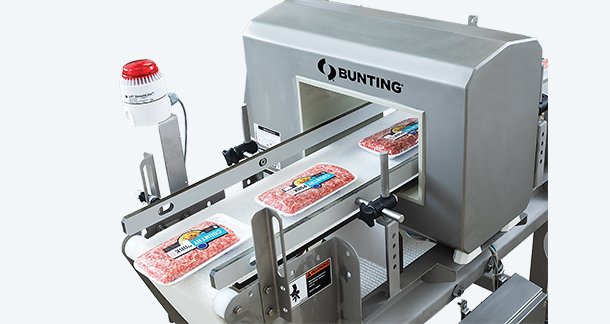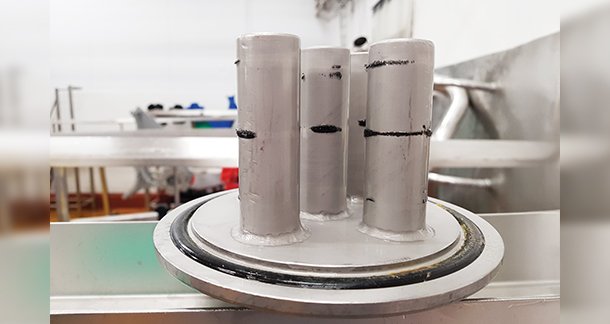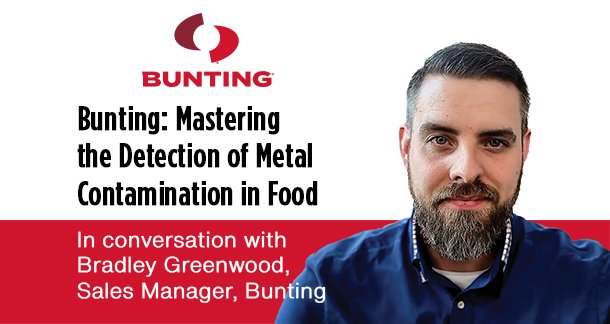In conversation with Bradley Greenwood, Sales Manager, Bunting, he discusses the advanced techniques to detect and combat metal contamination in food, Bunting’s role in the same, and their plans for the future.
Question- How has Bunting’s navigation of the Food & Beverage Industry been so far and what gaps did you notice in the Industry?
The manufacturing of food products involves many stages of processing. During this process, there is always a risk of introducing contamination in the form of metal wear and failure of processing equipment and the transportation of foodstuffs -especially over long distances, can introduce rogue items of metal (from nuts and bolts to fine abraded iron or stainless-steel) into the process. Unless there is sufficient metal removal and detection equipment in place, the contaminated product will reach the consumer. To ensure that all food is safe for consumers, any rogue metal needs removing prior to the finished food product reaching the point of sale. Effective identification and removal of such metal is achieved using Bunting magnetic separators and metal detectors.

Question– How does Bunting’s expertise in magnetic solutions contribute to both food safety and efficiency in food processing operations?
Metal contaminated food reaching the consumer is costly, both in reputation damage and reparations, including recalling the product. The presence of metal makes these products unsafe to eat and can cause mouth and throat lacerations, and damage the teeth. Ensuring food products are free of metal contamination and are safe to eat is not an option but a necessity.
In the manufacturing process, rogue metal also causes damage to expensive processing equipment. Such damage to a screen, pump or meat grinder could result in stopping the production process for a considerable time, reducing productivity and affecting key delivery times.
Understanding the process and installing the correct magnetic separators and metal detectors eliminates the metal contamination problem.
Question– What trends in the food and processing industries have shaped Bunting’s product offerings and development strategies?
Rising food demands and the continued drive for production efficiency means that any unnecessary downtime must be avoided.
Also, the speed in which news is communicated in the digital world means that a negative story about metal contaminated foodstuff can swiftly and seriously damage a company’s image and reputation. This can affect sales to both the end consumer and the supplier’s standing with the sales outlet (e.g. large supermarket or retail outlet).
Food companies turn to Bunting for support with addressing metal contamination issues. Bunting engineers conduct regular onsite surveys to assess the performance of magnetic separators and metal detectors, providing food producers with independent reassurance.

Question– What are the most critical contamination risks in food processing, and how do your technologies mitigate these effectively?
The most critical risk of metal contaminated food is injury to a consumer, with potential calamitous consequences for the producer.
Within the manufacturing process, catastrophic damage to process plant can result in a production operation shutting down for a prolonged period of time. Once again, this could result in a failure to meet delivery times and subsequent financial penalties or loss of business.
Bunting’s magnetic separators and metal detectors trap or identify metal contamination during the process and in the final product, ensuring the consumer and wholesaler only receive food free of metal whilst also protecting processing equipment.
Question – How is Bunting addressing the growing demand for sustainable practices and compliance with global food safety standards like HACCP and FSMA?
Bunting has worked with global food suppliers on sustainable practices and compliance with global food safety standards like HACCP and FSMA for decades. Working with food producers, Bunting has implemented annual audit processes to regular assess metal contamination prevention methods. This forms part of the food producer’s quality process, highlighting any areas of risk and recommending improvements.
Question – How do you foresee magnetic technology evolving to meet the future needs of the food and processing industries?
The ever-expanding global food supply chain means that foodstuffs are travelling longer distances and the proliferation of manufactured food products means that there is an increase in processing. Both increase the risk of metal contamination. Bunting is growing a team of application specialists who understand the food manufacturing process and are able to make the best recommendations for the installation of both magnetic separators and metal detectors. New stronger magnet materials, many with specific properties to operate in different environments (e.g. excessive heat, acidic or alkaline materials, etc.), will provide added protection and reassurance. Bespoke solutions may increase in line with the evolution of the diverse range of food manufacturing processes.



